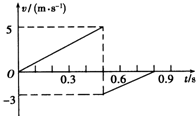阅读理解。
"Track!" said my master.
Like any good tracker-dog who has received the command(命令)he most loves, I gave a bark
of excitement, put my nose down to the ground and sniffed. The ground was rich with smells. Even
in the high-class housing area where we were working, the stones held traces of many soft and
confusing scents (smells). As I searched for the scent that would give me a clue to the tail of the
guilty man, my tail wagged slowly, thoughtfully, delightedly. Work was like play to me; I enjoyed it.
A small group of people gathered behind us. Among these onlookers was the old caretaker of
the building next door to ours. He spoke in a scornful voice, "You actually think your dog might catch
a thief three days after the event?" My master said nothing, but I'm sure he must have smiled. I did
not turn to look. I knew he would not speak unless it was to give me a new command.
I needed to concentrate. My task was difficult. I had to pick out one scent among the many that
lay about and then tracked it to its source.
"You're wasting your time," said the caretaker. I looked at him without raising my head. He was
running his hand over his fat stomach. His rough palm and smooth shirt combined to make a slight
noise. It was part of my training to be aware-often it is only a little whisper of a noise that alerts(提醒)
you to be drawing of a weapon. But of course the aging caretaker was going to do no such thing.
There was no smell of fear or nervousness about him. He was merely being clever and talkative.
"I've seen many tracker-dogs in my time," said the caretaker to the onlookers. "I served with
the police years ago. We would never have thought of using a tracker-dog to find a car thief.
Impossible. Everyone knows that dogs are useless in such matters."
In a sense he was right. I'm sure there's no need to tell you that, just as a dog's hearing is much
better than a human being's, so his sense of smell tells one thing from another far better than a great
detective. If Sherlock Holmes could work out that a man had had an egg for breakfast by seeing the
yellow stain on his mouth, a trained dog could tell you whether the hen that laid the egg was healthy
or not.
I know it sounds funny and I mean it to be. But I'm not exaggerating. A dog can tell you-if you
understand a dog's way of communicating-all this and more without even setting eyes on the man he
is investigating.
1. Who do you think the dog was tracking?
A. The thief.
B. The caretaker.
C. The master.
D. The onlookers.
2. How did the dog react to the command to track?
A. It thought for a while and did what was asked.
B. It was happy, even though it wasn't trained for the task.
C. It was angry because there were so many smells.
D. It was excited because it took pleasure in tracking.
3. In the dog's opinion, its sense of smell ______.
A. can give us fewer details about what a human has already discovered
B. can achieve more than what a human's only if the smell is not hidden
C. is particularly trained to pick out one scent among hundreds
D. is better than its sense of hearing when it does tracking
4. According to the passage, the dog is ______.
A. honest and hopeful
B. smart and helpful
C. kind and careful
D. popular and thoughtful
1~4 ADCB

